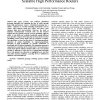Free Online Productivity Tools
i2Speak
i2Symbol
i2OCR
iTex2Img
iWeb2Print
iWeb2Shot
i2Type
iPdf2Split
iPdf2Merge
i2Bopomofo
i2Arabic
i2Style
i2Image
i2PDF
iLatex2Rtf
Sci2ools
101
click to vote
INFOCOM
2003
IEEE
2003
IEEE
Distributed Queueing in Scalable High Performance Routers
—This paper presents and evaluates distributed queueing algorithms for regulating the flow of traffic through large, high performance routers. Distributed queueing has a similar objective to crossbar-scheduling mechanisms used in routers with relatively small port counts, and shares some common high level characteristics. However, the need to minimize communication overhead rules out the iterative methods that are typically used for crossbar scheduling, while the ability to sub-divide the available bandwidth among different ports provides a degree of freedom that is absent in the crossbar scheduling context, where inputs must be matched to outputs. Our algorithms are based on four ideas (1) backlog-proportionalallocation of output bandwidth, (2) urgency-proportionalallocation of input bandwidth, (3) dynamic reallocation of bandwidth and (4) deferred underflow. Our algorithms guarantee congestion-free operation of the switch fabric. Our performance results show that for uniform random...
Related Content
| Added | 04 Jul 2010 |
| Updated | 04 Jul 2010 |
| Type | Conference |
| Year | 2003 |
| Where | INFOCOM |
| Authors | Prashanth Pappu, Jyoti Parwatikar, Jonathan S. Turner, Kenneth Wong |
Comments (0)

